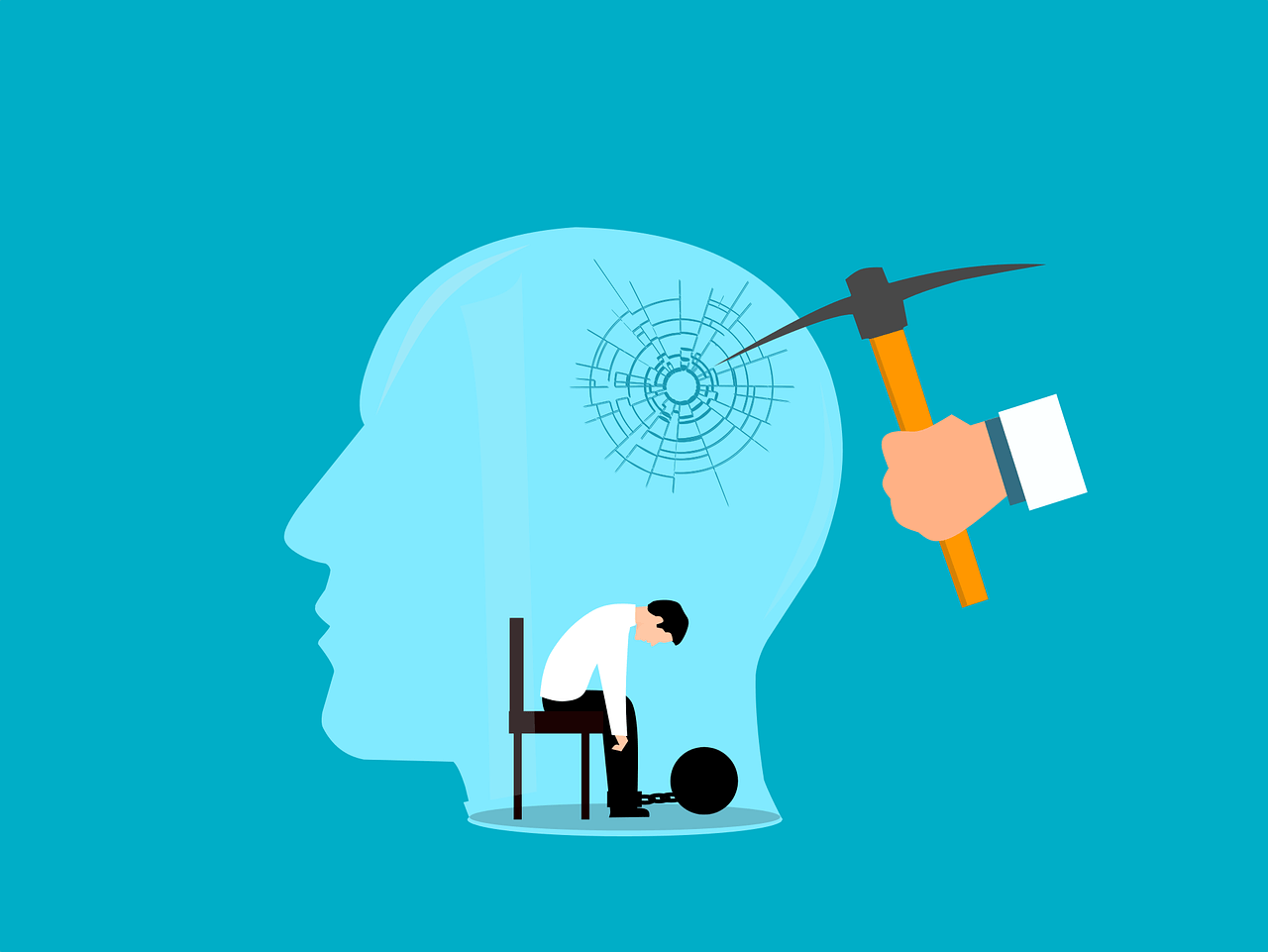Understanding Strategies to Stop overthinking and effective strategies to stop it. Overthinking is a common issue that can have detrimental effects on mental health and overall well-being. In this article, we’ll delve into what overthinking is, its causes, effects, and most importantly, practical strategies to overcome it.
Overthinking refers to the tendency of continuously dwelling on thoughts, worries, or situations, often to the point of obsession. It involves repetitive analysis of past events, imagining various scenarios for the future, or excessively focusing on potential problems. Overthinkers may find themselves trapped in a cycle of rumination, unable to break free from intrusive thoughts that lead to increased stress and anxiety.

Overthinking can significantly impact one’s mental health and overall well-being. To combat this, several strategies can be employed:
- Mindfulness and meditation: Practicing mindfulness can help become more aware of thoughts and reduce their frequency. Meditation techniques can also help calm the mind and reduce overthinking.
- Challenge negative thoughts: When overthinking, challenge the thoughts by asking if there is evidence to support them.
- Set aside a specific time each day for problem-solving and let go of intrusive thoughts outside of this time.
- Practice self-compassion: Be kind to yourself when you notice overthinking patterns and treat yourself with kindness and understanding.
- Engage in activities that distract and relax: Engaging in enjoyable activities can help shift focus away from repetitive thoughts.
- Limit rutification: Engaging in activities that require full attention or redirecting thoughts to more positive topics can help break the cycle of overthinking.
- Practice gratitude: Focusing on things you are thankful for can help shift your mindset from dwelling on negatives to appreciating positives in your life.
- Seek professional help: If overthinking is significantly impacting your daily life and well-being, consider seeking support from a mental health professional.
Overcoming overthinking requires time and practice, so be patient with yourself as you implement these strategies and seek support when needed.
Contents
Causes of Overthinking
Several factors can contribute to the development of overthinking tendencies.
Past Traumas
Traumas, including physical, emotional, and psychological, can significantly impact an individual’s thoughts, emotions, and behaviors.
Survivors often experience intrusive thoughts, emotional distress, hypervigilance, avoidance behaviors, negative beliefs, difficulty trusting, hyperarousal, flashbacks, nightmares, and physical symptoms.Trauma survivors face challenges in trust due to self-judgment and others’ intentions, causing relationship issues and hyperarousal, disrupting the body’s stress response system, exacerbated distress. Individuals may avoid places, people, or activities that remind them of traumatic events to cope with distressing memories.
Negative beliefs about themselves and others can lead to low self-esteem and difficulty forming meaningful connections. Intrusive thoughts and hypervigilance can cause overwhelming emotional distress, increased anxiety, and difficulty in relaxation or safety.

Perfectionism
Overthinking is a common issue among individuals driven by the desire for perfection and fear of making mistakes. This drive often stems from deep-rooted beliefs about the importance of achieving perfection or avoiding failure. Overthinkers often set unrealistic standards, fearing judgment and validation from others. This constant pressure to meet high expectations can lead to overthinking and a cycle of self-doubt. The fear of making mistakes or falling short of perfection can cause paralysis or indecision, preventing individuals from taking risks.
Overthinkers often engage in harsh self-criticism, reinforcing feelings of inadequacy and fueling overthinking. To break free from this cycle, individuals must challenge perfectionistic beliefs, learn to accept imperfection, and develop healthier coping strategies.
Fear of Failure
The fear of failure or rejection can significantly contribute to overthinking, as individuals constantly anticipate every possible outcome and seek to avoid potential pitfalls. This fear can stem from past experiences of failure or rejection, societal pressure to succeed, or personal insecurities. The fear can lead to perfectionism, catastrophic thinking, avoidance behavior, self-doubt, perceived judgment, rumination, and an excessive need for control.

Perfectionism is a mindset where individuals hold themselves to high standards and avoid making mistakes. This perfectionistic mindset can lead to overthinking as individuals obsessively analyze every decision or action, trying to avoid falling short of expectations. Catastrophizing is another form of fear, where individuals magnify the potential consequences of their actions or decisions, leading to overanalysis and indecision. Avoidance behavior, where individuals procrastinate or avoid taking risks to prevent failure, may provide temporary relief but ultimately reinforces overthinking.
Self-doubt is another form of fear, as individuals constantly second-guess themselves and their abilities, seeking external validation to alleviate their anxiety. Perceived judgment can also lead to overthinking as individuals try to anticipate others’ reactions and tailor their behavior to avoid criticism or rejection. Rumination can intensify feelings of anxiety and exacerbate overthinking tendencies.
To break free from this cycle, individuals must challenge negative beliefs about failure, learn to accept imperfection, and develop healthier coping strategies. Therapy, counseling, and mindfulness techniques can be valuable tools for individuals struggling with overthinking due to fear of failure or rejection.
Low Self-Esteem
Low self-esteem is a significant factor in overthinking, as individuals constantly doubt themselves and their abilities, leading to excessive self-criticism and overanalysis. This inadequacy can stem from past experiences of failure or criticism, negative self-comparisons, or internalized beliefs about one’s worth. Low self-esteem can result in negative self-talk, perfectionism, fear of rejection, self-doubt, comparison trap, analysis paralysis, imposter syndrome, and self-sabotage.
Negative self-talk involves constantly criticizing oneself for perceived flaws or shortcomings, reinforcing feelings of inadequacy and fueling overthinking. Perfectionism drives individuals to prove their worth through flawless performance or achievement, leading to overthinking as individuals obsessively analyze their performance or behavior. Fear of rejection can lead to overanalysis of social interactions and relationships, as individuals constantly second-guess themselves.

Self-doubt erodes confidence in one’s abilities and decisions, leading to pervasive feelings of judgment and capabilities. The comparison trap can also fuel overthinking as individuals ruminate on their perceived shortcomings and obsessively strive to measure up to unrealistic standards. Analysis paralysis can lead to overanalysis, leading to procrastination or avoidance behavior. Imposter syndrome can fuel overthinking as individuals constantly question their abilities and accomplishments, attributing their success to luck or deception rather than merit.
In conclusion, low self-esteem is a significant contributor to overthinking, leading to self-doubt, overanalysis, and sabotage. To break free from this cycle, individuals must challenge negative beliefs, build self-confidence, and develop healthier coping strategies.
External Stressors
Stressful situations, such as work pressure, relationship problems, or financial concerns, can lead to overthinking as individuals struggle to cope with uncertainty or perceived threats. These situations increase cognitive load, heighten anxiety, and evoke a sense of loss of control. Perceived threats can trigger the “fight-or-flight” response, leading to overthinking as individuals try to regain control.
Negative thought patterns can exacerbate these situations, as individuals magnify potential consequences and become consumed by irrational fears. Interpersonal dynamics can also trigger overthinking as individuals try to understand their interactions with others.
Cognitive biases, such as confirmation bias or availability heuristic, can exacerbate these situations, leading to distorted perceptions and overthinking. To break free from this cycle, individuals should develop effective coping strategies, such as mindfulness techniques, problem-solving skills, and seeking social support. Therapy, counseling, and stress management techniques can also be valuable resources for those struggling with overthinking due to stressful situations.
Effects of Overthinking
Overthinking is a common mental health issue that can lead to increased stress, depression, insomnia, poor judgment, and physical health issues. It can cause indecisiveness, poor judgment, and digestive issues, which can lead to missed opportunities or suboptimal outcomes.
Physical health impacts include headaches, muscle tension, and bodily discomfort, as well as digestive issues like stomachaches and nausea. Interpersonal relationships can also be strained due to overthinking, as individuals may become preoccupied with their own thoughts and worries, neglecting the needs and feelings of others.

Isolation can also occur due to overthinking, as individuals may withdraw from social interactions or avoid social situations altogether. Productivity and performance can be impaired by overthinking, as it diverts attention and mental resources away from tasks at hand. Additionally, impaired performance in academic or professional settings can be attributed to difficulty concentrating or making decisions under pressure. overthinking can have significant negative effects on mental health, decision-making abilities, physical well-being, interpersonal relationships, and productivity. Recognizing the signs of overthinking and implementing strategies to manage and reduce it can help individuals mitigate these harmful effects and improve their overall quality of life.
Mental Health Impacts
Overthinking is a common mental health issue that can lead to increased stress, anxiety, and depression. It involves constant mental activation, which triggers the body’s stress response, leading to heightened levels of cortisol and adrenaline. Overthinking also amplifies feelings of arousal, making individuals feel constantly on edge or overwhelmed. Disrupted cognitive processes, such as impaired concentration and memory impairment, can result from prolonged overthinking.
A negative mindset is often formed through rumination on negative thoughts, which can lead to a pessimistic outlook and feelings of hopelessness or despair. Cognitive biases, such as catastrophizing or black-and-white thinking, can also be exacerbated by overthinking.
Overthinking is strongly associated with rumination, a cognitive process characterized by repetitive and intrusive thoughts about negative experiences or emotions. This rumination is a key feature of depression and can contribute to the development or exacerbation of depressive symptoms.
Feelings of helplessness are another common symptom of depression, as prolonged overthinking can erode individuals’ sense of agency and control, further perpetuating negative thinking patterns. Recognizing the harmful effects of overthinking and implementing strategies to manage and reduce it is crucial for maintaining mental well-being.
Impact on Decision-Making
Constant overanalysis can significantly impact decision-making abilities, leading to indecisiveness and poor choices. Overthinkers may become overwhelmed by the multitude of options available, obsessively weighing the pros and cons of each choice, leading to indecision and paralysis. They often fear making the wrong decision, leading them to second-guess themselves and analyze every possible outcome. This fear can prevent them from taking action and committing to a course of action.
Impaired problem-solving skills are also affected by constant overanalysis. They may become distracted from the problem at hand, leading to a fragmented approach and a lack of creativity. Overthinkers may also procrastinate or avoid making decisions, avoiding responsibility and shifting blame onto external factors.
The pressure to make the “perfect” decision can exacerbate feelings of stress and anxiety, further fueling overanalysis. The more individuals overanalyze a decision, the more stressed and anxious they become, perpetuating a negative feedback loop.
To break free from this cycle, strategies to manage overthinking include setting time limits, seeking input from trusted advisors, and practicing mindfulness to focus on the present moment.
Strategies to Stop Overthinking
Overthinking is a common mental health issue that can lead to stress, anxiety, and rumination. To manage this, several techniques can be employed. Mindfulness meditation, which focuses on the present moment without judgment, can help individuals become more aware of their thoughts and emotions, reducing the tendency to overthink. Cognitive Behavioral Therapy (CBT) can help individuals identify and challenge negative thought patterns and beliefs that contribute to overthinking, reducing symptoms of anxiety and depression, improving problem-solving skills, and promoting healthier thought patterns.
Setting time limits for decision-making can prevent analysis paralysis and encourage timely choices. Self-compassion, which involves treating oneself with kindness and understanding, can help individuals develop resilience in the face of setbacks. Engaging in problem-solving activities can help individuals address challenges and find practical solutions. Limiting exposure to triggers, such as certain people, places, or activities, can create a more supportive environment for managing overthinking.
Lastly, seeking support from friends, family members, or mental health professionals can provide reassurance and validation, helping individuals feel less alone in their struggles and more empowered to address overthinking. By incorporating these techniques into daily life, individuals can manage overthinking more effectively, promote greater emotional well-being, and enhance decision-making abilities.
Mindfulness and Meditation. Mindfulness techniques and meditation are effective ways to cultivate present-moment awareness and reduce rumination. By paying attention to the present moment with openness, curiosity, and acceptance, individuals can become more aware of their thoughts, emotions, and bodily sensations. By focusing on a specific anchor, such as breath, bodily sensations, or sounds, individuals can observe thoughts or emotions without judgment and gently let go, bringing the focus back to the present moment. This practice helps individuals stay grounded and centered, fostering a deeper sense of connection and clarity.
Reducing rumination involves letting go of past regrets, worries about the future, and self-critical thoughts, fostering greater emotional resilience and well-being. By observing thoughts without judgment, individuals develop greater self-awareness and emotional regulation skills, responding to challenging thoughts or emotions with curiosity and kindness rather than avoidance or suppression.
In summary, practicing mindfulness techniques and meditation is a powerful way to cultivate present-moment awareness, reduce rumination, and observe thoughts without judgment. By integrating mindfulness into daily life, individuals can develop greater resilience, emotional well-being, and a deeper sense of connection to themselves and the world around them.

Challenge Negative Thoughts.Challenging negative thoughts is a key strategy for managing overthinking and fostering a more balanced mindset.
It involves recognizing negative thoughts, identifying common themes, questioning their validity, redefining negative thinking patterns, practicing self-compassion, using cognitive restructuring techniques, and seeking professional help when needed.
Recognizing negative thoughts involves paying attention to internal dialogue, identifying common patterns, questioning their validity, reframe negative thinking, and reality checking. Self-compassion is practiced by treating oneself with kindness and understanding, acknowledging that everyone experiences negative thoughts and that it’s okay to be imperfect. Cognitive restructuring techniques are used to challenge distorted thinking patterns. Countering negative thoughts with positive affirmations can help counteract them.
Set Aside Time for Problem-Solving. To manage overthinking and maintain mental well-being, it is essential to allocate specific time each day for addressing concerns or worries. This can be done by scheduling a dedicated “worry time” and incorporating it into your daily routine. During this time, focus on problem-solving and brainstorm potential solutions. Set boundaries by consciously letting go of intrusive thoughts and worries, practicing mindfulness, engaging in engaging activities, and pursuing hobbies.
Develop coping strategies, such as stress management and coping skills, to manage anxiety and uncertainty. Practice self-compassion by treating yourself with kindness and understanding, especially when facing challenges or setbacks. Accept that it’s normal to experience worries and recognize that you can manage them effectively. Regularly evaluate the effectiveness of your worry time strategy and adjust it as needed. If worries persist or interfere with daily functioning, seek support from a therapist or counselor for additional guidance. Consistent practice and patience are key to mastering this technique and experiencing lasting benefits.
Practice Self-Compassion. To combat overthinking, one should practice self-awareness, cultivate self-kindness, challenge self-criticism, embrace imperfection, set realistic expectations, practice mindfulness, seek support from friends, family, or mental health professionals, prioritize well-being, and cultivate gratitude.
Recognize that overthinking is a common experience and acknowledge that you are not alone in this struggle. Offer yourself compassion and understanding, treating yourself with kindness and empathy. Counter negative self-talk and self-criticism by reframing your inner dialogue with kindness and encouragement. Embrace imperfections and accept that mistakes and setbacks are opportunities for growth and learning.
Set realistic expectations for yourself and allow yourself to make mistakes and learn along the way. Practice mindfulness techniques to stay present and grounded in the present moment. Seek support from trusted individuals who can offer empathy, validation, and guidance.
Engage in self-care by prioritizing physical, emotional, and mental well-being, and focus on the positive aspects of life. Cultivate gratitude by focusing on the things in your life that bring joy, fulfillment, and meaning.
By being kind to yourself, you can cultivate greater self-compassion, resilience, and emotional well-being. Remember that self-compassion is not about avoiding challenges or difficult emotions but about embracing them with kindness and understanding.
Engage in Relaxing Activities.Engaging in activities that promote relaxation and distract the mind from overthinking is a valuable strategy for managing stress and shifting focus away from repetitive thoughts. Some effective activities include engaging in hobbies, such as painting, writing, gardening, or crafting, which provide a sense of fulfillment and flow. Regular exercise, such as walking, jogging, yoga, or dancing, releases endorphins, chemicals in the brain that promote happiness and well-being. Spending time with loved ones, such as friends, family members, or pets, can also help distract the mind from overthinking and provide emotional support.
Practicing relaxation techniques, such as deep breathing exercises and progressive muscle relaxation, can help reduce stress and promote a sense of calm. Spending time outdoors in nature can also help reduce stress and promote peace and tranquility. Mindfulness meditation can help cultivate present-moment awareness and reduce overthinking. Listening to calming music, nature sounds, or guided meditations can also help soothe the mind and promote relaxation.
Lastly, engaging in self-care activities that nourish the body, mind, and spirit, such as taking a warm bath, practicing aromatherapy, or treating oneself to a massage or spa day, can also help alleviate stress and cultivate a greater sense of well-being.
Limit Rumination.Rumination is a negative thought pattern that can lead to overthinking and worry. To break this cycle, engage in mindful activities that demand full attention, practice mindfulness meditation, redirect thoughts to positive topics, practice cognitive distraction techniques, engage in physical activity, socialize with others, set achievable goals, and seek professional support if needed.
Focusing attention on activities that require full attention, practicing mindfulness meditation, and redirecting thoughts to positive topics can help distract the mind from rumination. Cognitive distraction techniques, such as mantras or mental exercises, can help shift focus away from rumination and into the present moment. Physical activity releases endorphins, which can reduce stress and anxiety.
Socializing with others can provide emotional support and provide distraction from rumination. Setting small, achievable goals and taking action towards them can shift attention away from rumination and towards positive outcomes.
If rumination persists, consider seeking professional support, such as cognitive-behavioral therapy (CBT) techniques, to identify and challenge rumination patterns effectively. Consistent practice and patience are crucial for developing healthier thinking habits and promoting overall well-being.
Practice Gratitude.A gratitude habit can reduce overthinking and promote happiness, resilience, and well-being. To practice, create a daily gratitude journal, focus on the present moment, celebrate small victories, express gratitude to others, reflect on challenges, practice positive self-talk, cultivate a gratitude mindset, and incorporate gratitude rituals. By focusing on the present moment, acknowledging small victories, strengthening relationships, and reflecting on strengths and qualities, one can shift their mindset from dwelling on negatives to appreciating positives in life. This shift in perspective can lead to greater happiness, resilience, and well-being.
Seek Professional Help.Overthinking can significantly impact daily functioning and well-being, making seeking support from a mental health professional advisable. Therapy, counseling, or cognitive-behavioral techniques can provide personalized strategies to manage overthinking and improve mental health. Mental health professionals can offer tailored strategies, such as cognitive-behavioral therapy (CBT), which helps individuals identify and challenge unhelpful thought patterns, develop coping skills, and change behaviors contributing to overthinking.
A supportive environment is provided through therapy, where individuals can explore their thoughts, emotions, and concerns openly. Psychologists can help develop coping skills, such as relaxation techniques, mindfulness practices, problem-solving strategies, and assertiveness training, to manage stress, anxiety, and overthinking more effectively.
Emotional regulation is also a key aspect of therapy, helping individuals manage their emotions and tolerate uncertainty. Mental health professionals can help identify underlying issues contributing to overthinking, such as past trauma, low self-esteem, or perfectionism, and make lasting changes to their thinking patterns and behavior.
A holistic approach to treatment, considering various factors contributing to overthinking, is also offered by mental health professionals. Seeking support from a mental health professional is a proactive step towards managing overthinking tendencies and improving mental health.
conclusion
Overthinking can significantly impact mental health and decision-making processes, causing increased stress, anxiety, and depression. It also hampers effective decision-making by causing indecisiveness, analysis paralysis, and impaired problem-solving abilities. Understanding the underlying causes of overthinking is crucial, including past traumas, perfectionism, fear of failure, and stressful situations. Addressing root causes, such as low self-esteem, cognitive distortions, and maladaptive coping mechanisms, can help manage overthinking.
Practicing mindfulness techniques can promote a balanced perspective and reduce rumination. Challengeing negative thoughts can help shift focus to positive or productive topics. Seeking professional help from a mental health professional can provide personalized strategies and emotional support.
Embracing a holistic approach, including combining strategies, adopting healthy lifestyle habits, and cultivating gratitude, can help address overthinking from multiple angles. Actively managing overthinking tendencies can lead to greater resilience and empowerment. Overcoming overthinking can enhance decision-making, leading to better outcomes and satisfaction. Ultimately, implementing practical strategies and seeking support can lead to improved well-being, greater peace of mind, and a more fulfilling life.
FAQ
: Is overthinking a sign of intelligence?
A1: While overthinking can sometimes be associated with analytical thinking, excessive rumination is more likely to hinder productivity and decision-making rather than enhance intelligence.
Q2: Can overthinking lead to physical health problems?
A2: Yes, chronic overthinking can contribute to stress-related health issues such as high blood pressure, insomnia, and weakened immune function.
Q3: How do I know if I’m overthinking?
A3: Common signs of overthinking include repetitive thoughts, difficulty making decisions, excessive worrying, and heightened anxiety.
Q4: Can overthinking be cured completely?
A4: While it may not be possible to completely eliminate overthinking, it can be effectively managed through self-awareness, coping strategies, and professional support.
Q5: Are there any benefits to overthinking?
A5: While occasional reflection and analysis can be beneficial, excessive overthinking tends to lead to negative outcomes and is generally not advantageous.

